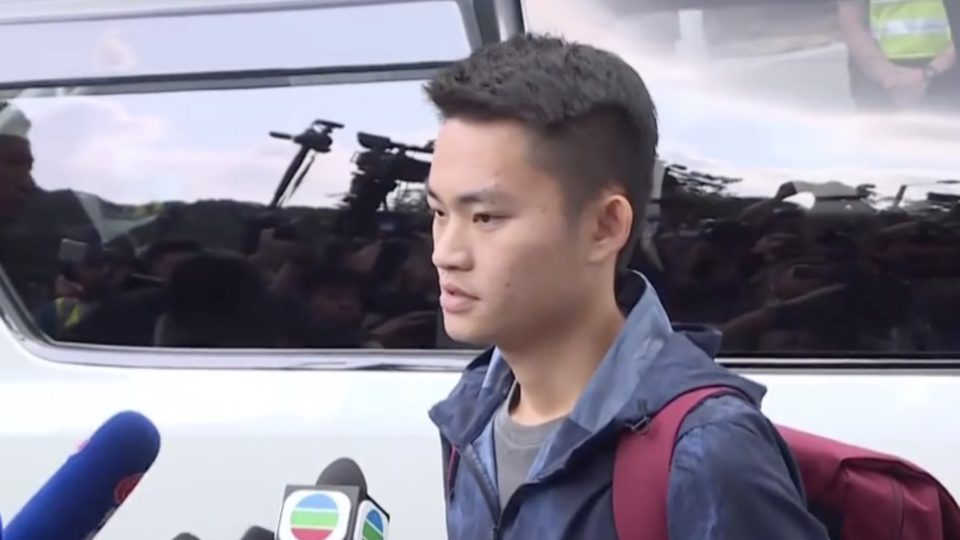Chan Tong-kai — the accused murderer whose case in Taiwan sparked the extradition bill row and months of protests in Hong Kong — was released from maximum-security prison this morning.
A handful of riot police were stationed outside Pik Uk Prison in Clearwater Bay today as hordes of reporters gathered to catch a glimpse of Chan, who was serving a shorter sentence for money laundering. He is still wanted by Taiwanese authorities for the murder of his girlfriend Poon Hiu-wing.
Shortly after leaving the prison gates, Chan apologized to Poon’s family and bowed.
“I understand that I’ve done an unforgivable wrong, and caused them a lot of pain and suffering,” he said. “This is my responsibility, therefore I’m willing to surrender myself to Taiwan because of my own impulses and mistakes, to go to trial and be sentenced in Taiwan. I hope that this will give the family some relief and that Hiu-wing’s spirit can rest in peace.
“To the society, and to Hongkongers, I can only say sorry. I hope everyone can forgive me and give me the opportunity to start over.”
Chan didn’t respond to questions as to whether he was still planning on buying plane tickets for Taiwan, or if he felt he’d become a political pawn between Taiwan and Hong Kong as disagreements between the two over his return have metastasized into a diplomatic spat.
He then bowed again, and got into a car with pastor Peter Koon Ho-ming, who first revealed Chan’s willingness to surrender, and left.
Just how — or whether — Chan makes it to Taiwan remains to be seen as both the self-governing island and the SAR government engage in an increasingly bitter, and baffling, feud through the press.
Last week it was reported that Chan had written to Chief Executive Carrie Lam saying he was willing to hand himself over to the Taiwanese authorities. But Taiwan responded by saying they would refuse to grant Chan entry unless Hong Kong complied with formal judicial cooperation procedures. They had also urged Hong Kong to consider trying Chan for the murder, despite its repeated insistence that it doesn’t have jurisdiction.
The response prompted Chief Secretary Matthew Cheung to urge Taipei not to “exploit politics” in the case, and to accept Chan’s surrender.
Hours later, Taiwan appeared to soften its stance, saying they would send police officers to to escort Chan to Taiwan and asking Hong Kong to share any evidence they had gathered pertaining to his case. After hours of apparent radio silence from the Hong Kong side, however, Taiwan issued another, testier statement seeking a response, according to the SCMP.
That response came late last night, or rather early this morning, with the Hong Kong government issuing its own testy statement rejecting Taiwan’s offer. Sending officers to collect Chan, the statement said, would amount to “cross-jurisdiction law enforcement, which is a disrespect for Hong Kong’s jurisdictional power and is totally unacceptable.”
The diplomatic tangle illustrates what made Chan’s case so thorny from the start. When Chan first fled from Taiwan back to Hong Kong after the murder, the lack of an extradition agreement and Hong Kong’s insistence that it lacked jurisdiction meant he couldn’t be prosecuted for the killing.
Chief Executive Carrie Lam cited the case in putting forward amendments to the city’s extradition law that would have allowed extradition to Taiwan. The amendments, however, also would have allowed extraditions to mainland China, prompting widespread fears and setting of a massive protest movement in opposition to the bill.
That movement — now more than four months old — has since expanded into calls for broader democratic reforms and police accountability, among other things. The extradition bill, meanwhile, was ultimately scrapped amid the backlash.




